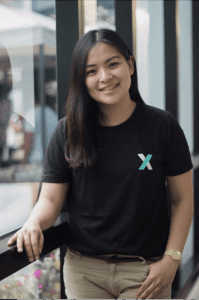by Samantha Sheane Chico
The Philippines’ startup sector is no different. In general, it is observed that there are more male founders active in the startup space. There are also more male founders who apply and get accepted in incubator and accelerator programs, present during pitching competitions, and receive grants and investments. Although not absent, there are significantly fewer female founders during these occasions compared to their male counterparts.
Nonetheless, Filipina startup founders continue to make significant waves on their own. In this piece, we have Filipina founders Ginger Arboleda, Steph Naval, and Zaira Verunque talk about their experiences navigating the Philippine startup ecosystem with confidence and passion.

Ginger is the Chief Operating Officer (COO) of Taxumo, a web application that focuses on collections and tax compliance for MSMEs, professionals and freelancers. In 2016, Ginger co–founded her startup alongside her husband, and two other friends. Ginger is also a mother to two wonderful daughters.

Steph is the founder and the Chief Executive Officer (CEO) of Empath. Finding inspiration from her own mental health journey, Steph is a young Filipina founder of a startup that aims to make mental health services more accessible to individuals and organizations.

Zey is a serial entrepreneur currently based in Dubai, United Arab Emirates, and the Founder-Chief Executive Officer (CEO)of the startup IBoard Living. IBoard Living is a web application that centralizes the property management and experience of renters, property owners, and home service providers in one platform.
The Philippine startup space is still in its nascent stage, with just over a decade of receiving formal support from stakeholders. In recent years, the space has seen an increase in startup founders and investment funding. Ginger, Steph, and Zey all describe the Philippine startup sector, albeit still male-dominated, as very supportive of Filipina Founders.Ginger shared, “When we started our tech startup in 2016, the Philippine startup scene was largely male-dominated, and there were few female founders. As a woman entrepreneur, I struggled to find mentors and role models who shared my experiences and perspectives. This lack of diversity and representation reflected wider cultural biases that limit women’s participation and leadership in the tech industry.
However, I’m heartened by the changes that have been taking place in recent years. More Filipinos, including women, are embracing entrepreneurship and exploring opportunities to start their own businesses or work as freelancers. I believe this shift is partly due to the growing recognition of the potential and benefits of the startup ecosystem, as well as the efforts of organizations and initiatives that promote diversity, equity, and inclusion in tech. I’m optimistic that we’ll see more Filipina founders and leaders in the tech scene, and that by supporting each other and creating more avenues for resources and mentorship, we can build a more innovative and inclusive tech community in the Philippines and beyond.”
Additionally, “the mental health space is dominantly female, but when it comes to business and entrepreneurship, or even the startup space, it’s really dominantly male. I really appreciated that there are a lot of female-centered programs from government institutions and also other startup incubators. These programs help us access support from female founders. As a female founder, you also go through different experiences compared to other male founders. I really appreciate the community that’s slowly being built here in the Philippines for female entrepreneurs.” Steph said.
Based on her experience, Zey mentioned that, “the startup community in the Philippines is very supportive of Female Founders. Even in business, I’ve had the pleasure of working with very inspiring women. But of course, I had to adjust given that the real estate sector is more of a male industry. “
However, they shared that as female founders, they experience the ecosystem somehow differently.
Zey said, “as women, we have to learn to balance many things, including our own bodies and the expectations of society. One example, I am emotional when I experience symptoms of premenstrual syndrome. I needed to learn to strategize and consider how my body is feeling when doing my work. Now, I know that I should try not to make big decisions during my period because I know I’m not at the top of my game. Of course, this puts us at a disadvantage when compared to male colleagues. In my experience, I also have to adjust the way I present myself just to be taken more seriously in a room full of men.”
On the other hand, Ginger observed that some investors would ask female founders a few questions that they wouldn’t necessarily or usually bring up if they were talking with a male founder.
“When I entered this ecosystem, I was already married and had one child. So, a lot of these investors would ask me ‘as a mom how do you propose that you balance your time between running a startup and also like raising your kids?’ ‘can you handle the pressure now with two daughters?’ I mean, even with two daughters, I can still prove them wrong. I can juggle all of these things while I’m doing what I love.”
Ginger further added that there were questions about how they will manage to run the company as a couple. She and her husband, EJ, needed to convince that they are not just a couple, but two individuals with skills and competencies enough to successfully grow their startup. “When we were first starting out, I used to get emotional when we were rejected for funding. However, I’ve come to realize that investors are just doing their job and looking out for their business interests. Instead of taking it personally, I try to see it as a negotiation and an opportunity to learn and improve our pitch. By focusing on our strengths and addressing any concerns or feedback we receive, we can build stronger relationships with potential investors and increase our chances of securing funding in the future.”
For Steph, she highlighted the need for more stories and representation of and by women.
“You would feel a lot of doubt, especially when you’re trailblazing and a new type of demographic. Sometimes, certain tips from male entrepreneurs and founders may not necessarily apply to female founders who are going through specific struggles. Male founders definitely have more success stories because they were the ones favored. It’s about time that we see more successful female founders. It’s really amazing to hear stories of other successful female founders, especially from those similar to my age.”
Given these nuances, there is a need for Filipina Founders to display confidence so that they can play at equal footing with everyone else.
“Confidence really stems from the fact that you know that you are the solution. That you, creating change will really benefit a lot of people.” Ginger shared.
For our female founders, confidence is a product of several factors. This includes individual upbringing, education, and the support system available. For example, one founder’s confidence can improve by trying to learn new things about the business and the ecosystem. Learning can also come from the stories of success and failures of others. This is why female representation is very important, especially for nascent ecosystems such as that of the Philippines. Having the right support system is also very important. According to Ginger, Steph and Zey, understanding the predicament of women is a must to cultivate a culture of confidence among Filipina Founders. It goes beyond sharing of stories, but practicing approaches that lighten the burden to females.
For Ginger, it meant giving space to female employees to take care of domestic responsibilities without fear of unemployment. For Steph, it meant being aware of conscious and unconscious bias towards women, and accepting all forms of women empowerment. For Zey, it meant having supportive males that give space for women to realize and practice their own power to lead, and create.
Aside from these, they also gave several recommendations to make the Philippine Startup ecosystem conducive for Filipina founders:
- Provide opportunities and venues for Filipina founders to share stories of failures and successes;
- Encourage learning and make information accessible for startup founders;
- Implement grant programs dedicated for female founders; and,
- Involve men, young boys and girls in the discussion of women empowerment, not just to create allies but to create a society where men and women are treated as equals.
In a perfect world, being a Filipina Founder means having the freedom to pursue one’s mission with passion and without fear or limitations. In reality, being a Filipina founder is a balancing act of managing the expectations of society and oneself. Ginger, Steph and Zey convey the importance of positive self-talk, courage, and celebrating one’s victories.
In the words of Zey “When I became a startup founder, I realized that I have to celebrate my accomplishments because if I don’t do it, nobody else will do it. I celebrate not just for me, but for the team that worked hard with me.”
To end, our founders shared their message for their fellow Filipina founders:
“Just do it and believe in yourself. You’ll be amazed and surprised of how much greatness you can achieve with just you believing in yourself and just trying it out. The worst thing that can happen is that you’ll fail, and you’ll learn even more and you’ll get even wiser.”– Steph Naval.
“Try to learn something new every day. There are a lot of things to learn in this kind of business where the industry is so fast-paced and dynamic. There are a lot of things that are changing so there are a lot of things to learn. Upskill yourself. To keep up and stay competitive, it’s essential to invest in self-improvement and skill development. This means keeping an open mind and being curious about new ideas and concepts. Don’t be afraid to explore new terms, tools, and methods. Experimentation and trial-and-error are part of the learning process, so don’t be discouraged by setbacks or failures. Instead, use them as opportunities to refine your approach and try new things.” – Ginger Arboleda.
“I know that it can be difficult to be confident, especially when you’re navigating a male-dominated industry or society. But I want you to know that you have the skills, the knowledge, and the passion to succeed. Don’t let anyone tell you otherwise. Remember that confidence is not something that you’re born with. It’s something that you can develop over time. So don’t be afraid to speak up, to take up space, and to be the best version of yourself. Because when you’re confident, you can achieve anything you set your mind to.” – Zey Verunque.
Learn more about PhilDev through www.phildev.org or reach out to them through info@phildev.org.
